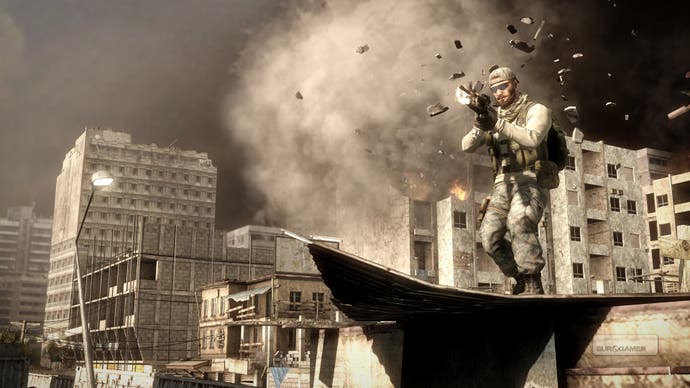Play Fighting
What is it good for?
"Films turn war into entertainment, so why not games?" goes one popular argument. But that ignores the simple fact that games are not films. Games, by their nature, focus almost entirely on the action. Story can be woven around it, but the core of the experience is hours and hours of endless shooting.
Games, and online first-person shooter games in particular, don't do things like pathos, doubt and ambiguity well - if at all. When your friend gets killed you laugh, or insult him, or headshot the little scrote who took him out. In a perpetual online fragfest, the tug of war between the thrill of pulling the trigger will always win out over the dramatic need to give each bullet meaning.
"It's OK to kill Nazis, so why is Afghanistan any different?" is another common response. It's a valid argument, up to a point. For a lot of people, the World War II games are no more "OK" than more modern shooters. My grandfather fought in that war, an experience so horrible he refuses to talk about it. He'd be aghast at any random five-minute chunk of World at War - a game which I enjoyed, albeit in the same slightly guilty manner Charlie Brooker described.
But World War II is a different war from a different time. Not only was it fought against a clear national enemy bent on violent expansion, it has been so thoroughly absorbed into the cultural fabric that different approaches can co-exist. There's distance enough that, as a society, the cruel reality of newsreels and mass graves can be separated from the fictional war of The Dirty Dozen and Action Man.
The creators of Medal of Honor aren't wrong to reboot the series in the modern day, using Kabul and the Helmand Province as the backdrop to thrilling shoot-outs. However, nor is such a decision exempt from questions of bad taste or exploitation. There are as many answers as there are people playing games, but the questions deserve to be asked regardless.

We rightly reject the notion that playing violent games can turn someone into a trenchcoated killer. Why do we so eagerly embrace the opposite fallacy, that it's possible to lose ourselves in this material for hours at a time with absolutely no effect? Not with regard to the violence in itself, but the context. In 1991, the invasion of Iraq was compared to a videogame. Now the videogames and the wars have become one and the same.
Are we really prepared to argue to the non-gaming world that we see no cognitive difference between shooting an oogly boogly space monster with a ray gun and shooting at real people, in real places, using painstakingly detailed weapons based on real military stock?
Both might be fun, but to conflate the two is problematic. Having been the scapegoat of most recent media scare stories, it's understandable that the gamer's first response is to put fingers in ears and repeat the "only a game" mantra. The problem is, doing so only makes us look even more like the sociopathic deviants the tabloids would paint us as.
I'll play Medal of Honor, of course. I'll play Bad Company 2's Vietnam expansion. I'll play Call of Duty: Black Ops. Not just because it's my job, but because I enjoy them. How much longer I'll enjoy them is another question.
The line in the sand, for me, is uncomfortably close. By not thinking about why we enjoy gunning each other down in these playgrounds of destruction, recasting the horrors of real battlefields for our excitement and amusement, we do ourselves and the games industry a disservice. We should not leave the debate open to those who would fill in our motives with uneducated speculation and prejudice.
